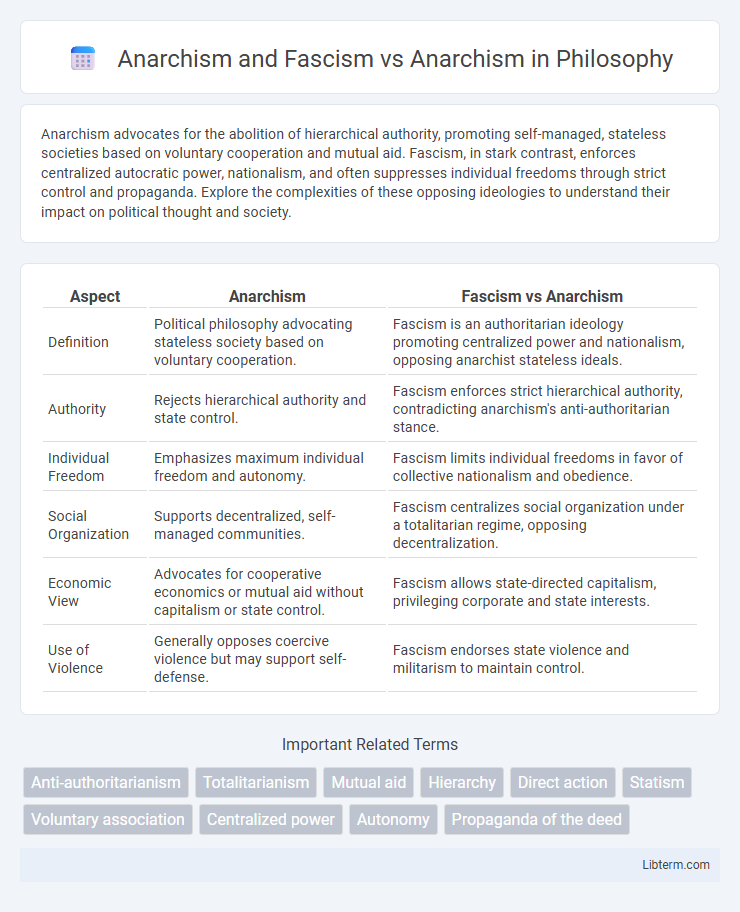Anarchism advocates for the abolition of hierarchical authority, promoting self-managed, stateless societies based on voluntary cooperation and mutual aid. Fascism, in stark contrast, enforces centralized autocratic power, nationalism, and often suppresses individual freedoms through strict control and propaganda. Explore the complexities of these opposing ideologies to understand their impact on political thought and society.
Table of Comparison
| Aspect | Anarchism | Fascism vs Anarchism |
|---|---|---|
| Definition | Political philosophy advocating stateless society based on voluntary cooperation. | Fascism is an authoritarian ideology promoting centralized power and nationalism, opposing anarchist stateless ideals. |
| Authority | Rejects hierarchical authority and state control. | Fascism enforces strict hierarchical authority, contradicting anarchism's anti-authoritarian stance. |
| Individual Freedom | Emphasizes maximum individual freedom and autonomy. | Fascism limits individual freedoms in favor of collective nationalism and obedience. |
| Social Organization | Supports decentralized, self-managed communities. | Fascism centralizes social organization under a totalitarian regime, opposing decentralization. |
| Economic View | Advocates for cooperative economics or mutual aid without capitalism or state control. | Fascism allows state-directed capitalism, privileging corporate and state interests. |
| Use of Violence | Generally opposes coercive violence but may support self-defense. | Fascism endorses state violence and militarism to maintain control. |
Defining Anarchism: Core Principles and Ideals
Anarchism centers on the rejection of all hierarchical authority and advocates for self-managed, stateless societies based on voluntary cooperation and mutual aid. Its core principles emphasize individual freedom, direct democracy, and the dismantling of oppressive systems to achieve social equality. Unlike fascism, which upholds authoritarian control and nationalistic supremacy, anarchism promotes decentralization and the abolition of coercive institutions.
Historical Origins of Anarchism and Fascism
Anarchism emerged in the 19th century as a radical political philosophy advocating for stateless societies based on voluntary cooperation and mutual aid, heavily influenced by thinkers like Pierre-Joseph Proudhon and Mikhail Bakunin. Fascism originated in early 20th-century Europe, particularly post-World War I Italy, characterized by authoritarian nationalism, centralized power, and suppression of dissent, with key figures such as Benito Mussolini shaping its ideology. The historical origins of anarchism center on anti-authoritarian critiques of capitalism and the state, while fascism arose as a reactionary movement opposing both liberal democracy and socialist ideologies, seeking to unify the nation through totalitarian means.
Anarchism vs Fascism: Ideological Contrasts
Anarchism and Fascism represent diametrically opposed political ideologies rooted in fundamentally different views on authority and individual freedom. Anarchism advocates for a stateless society prioritizing voluntary cooperation, direct democracy, and the abolition of hierarchical power structures, whereas Fascism enforces authoritarian control, centralized power, and suppresses dissent to maintain nationalistic unity. These ideological contrasts highlight anarchism's emphasis on liberty and equality against fascism's focus on control, order, and supremacy.
Power Structures: Hierarchy vs Anti-Authoritarianism
Anarchism fundamentally rejects hierarchical power structures, advocating for decentralized, non-authoritarian communities where individuals freely cooperate without imposed domination. Fascism, by contrast, enforces strict, top-down hierarchies centered on authoritarian leadership, nationalism, and coercive control over society. The core distinction lies in anarchism's commitment to dismantling all forms of centralized authority, emphasizing autonomy and mutual aid, whereas fascism thrives on concentrated power and suppression of dissent.
Economic Systems: Collectivism, Capitalism, and State Control
Anarchism advocates for collectivism and the abolition of hierarchical state control, promoting decentralized, voluntary cooperation in economic systems. Fascism supports a state-controlled economy that maintains capitalist structures to serve authoritarian national interests, emphasizing centralized power and rigid control over production. In contrast, Anarchism rejects capitalism's profit-driven motives and state intervention, seeking instead an egalitarian, stateless society based on mutual aid and communal ownership.
Social Organization: Voluntary Association vs Enforced Unity
Anarchism advocates for social organization based on voluntary association, emphasizing individual freedom and mutual cooperation without hierarchical authority. Fascism enforces unity through a centralized, authoritarian government that suppresses dissent and mandates conformity to state ideology. The fundamental clash lies in anarchism's rejection of coercive control versus fascism's insistence on enforced social order.
Use of Violence: Revolution, Repression, and Resistance
Anarchism advocates for the use of violence primarily as a means of revolution and resistance against oppressive structures, emphasizing decentralized, grassroots actions to dismantle state and capitalist systems. Fascism employs violence as a tool for repression and control, enforcing authoritarian rule through state-sanctioned terror, police brutality, and paramilitary forces to suppress opposition. Anarchism's use of violence is inherently oppositional and seeks to empower marginalized communities, contrasting with fascism's violence intended to maintain hierarchical power and social order.
Case Studies: Anarchism Confronting Fascism
Case studies of anarchism confronting fascism reveal intense grassroots resistance rooted in decentralized, anti-authoritarian organizing contrasting sharply with fascism's hierarchical, totalitarian structure. For instance, during the Spanish Civil War, anarchist militias played a crucial role in fighting Francoist forces, emphasizing collectivist principles and worker self-management. These encounters demonstrate anarchism's strategic adaptability and ideological commitment to opposing fascist oppression through direct action and community mobilization.
Contemporary Relevance: Modern Movements and Clashes
Contemporary relevance of anarchism and fascism highlights stark ideological clashes seen in modern political movements and protests worldwide. Anarchism promotes decentralized, stateless societies focused on direct action and social equality, while fascism enforces authoritarian control and nationalism, often leading to violent suppression. Current social movements and counter-movements reflect this tension, with clashes occurring in urban centers, online spaces, and political arenas, shaping debates on governance, freedom, and civil rights.
Future Prospects: The Ongoing Struggle Between Freedom and Authority
The future of anarchism hinges on its ability to challenge rising authoritarianism by promoting decentralization, direct democracy, and individual autonomy. As fascism resurges globally through nationalist and totalitarian ideologies, anarchist movements emphasize grassroots activism and social justice to resist state control and oppression. The ongoing struggle between freedom and authority shapes political discourse, with anarchism advocating for a stateless society that prioritizes equality and voluntary cooperation.
Anarchism and Fascism Infographic

 libterm.com
libterm.com